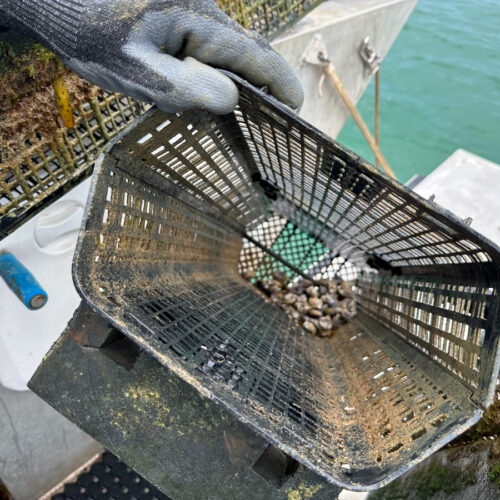
- Reference # A.2.2122025
- Project Status Current
- Timeframe 3.5 years (2022 to Oct 2026)
- Project manager Sarah Docherty
- CRCNA Funding $1,400,000
- Total project value $3,058,076
- Project research participant NT Government (Darwin Aquaculture Centre) ; Yagbani Aboriginal Corporation ; Groote Aqua Aboriginal Corporation
- Research Programs 2. New and developing industries in Northern Australia
- Location Darwin, Groote Eylandt, South Goulburn Island
- Aquaculture
- First Nations led business development
Summary
This project will continue to build on the foundational work undertaken by researchers at the Darwin Aquaculture Centre, as part of an initial Tropical Rock Oyster research and development project (A.2.1819053NT).
During the first phase of the CRCNA-funded project (2019-2023), significant progress has been made in this space, culminating in the development the world’s first hatchery manual for the Blacklip Rock Oyster (BRO). Over this period, hatchery production at the Darwin Aquaculture Centre (DAC) has increased exponentially (from 10,000s to 100,000s spat per spawning run). This increase in production is a direct result of improved hatchery techniques, which have been enhanced through broodstock conditioning, settlement and nursery trials conducted during the first project phase.
However, as production has scaled up, new challenges have emerged in the nursery, resulting in inconsistent spat yields. Further research is required to continue to optimise production and reduce variability in spat production between spawning runs, which is critical to ensure farms can consistently access commercial quantities of advanced spat, and thereby build industry confidence and encourage private investment.
The project will continue refinements to year-round supply of hatchery-reared spat (juvenile oyster) as this is fundamental to commercialisation, building confidence and encouraging investment.
Extension and mentoring will be provided to support oyster farmers and Indigenous communities and farming trials across the Northern Territory.
Expected outcomes
Jobs and economic impact
An established Tropical Rock Oyster industry is expected to create more than 900 direct and indirect regional jobs in Northern Australia within 20 years, adding an estimated $217 million to the north’s economy. These jobs will be multi-disciplinary and include farm technicians, key trades, vessel operators, machinery supplier, processors and distributors. Oyster grow-out is a labour-intensive process due to the requirement for continual grading of oysters and management of oyster gear biofouling.
Increased investment
The Pilbara Development Commission estimates to build a 100,000 dozen oysters a year commercial farm would require an investment of approximately $3 million. In addition to commercial farming operations there are significant opportunities for First Nations’ communities to participate in the industry as independent ventures or as joint venture enterprises with shellfish aquaculture companies.
Social well-being
This project involves extensive First Nations’ participation in foundational research, industry and business development. This direct access to researchers, agencies and industry provides an opportunity for community empowerment and informed decision making regarding their participation in this emerging industry either directly or through partnership arrangements. The access to training and experience in research and aquaculture recognises First Nations aspirations for greater involvement in managing sea country and provides opportunities for two-way capacity building and knowledge exchange between First Nations community researchers and industry, agencies and research organisations.

